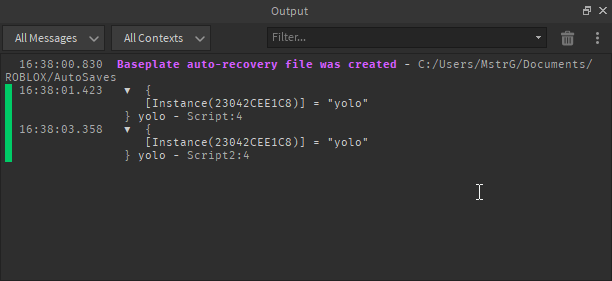You can write your topic however you want, but you need to answer these questions:
-
What do you want to achieve? Keep it simple and clear!
I want to pass tables to another script.
-
What is the issue? Include screenshots / videos if possible!
When I try to use a bindable function to pass the table, the instances in the table change.
script1:
script2:
Output:
-
What solutions have you tried so far? Did you look for solutions on the Developer Hub?
Storing the table in a module script, but I put the code to create the table in a regular script and I can’t move the table over to the module script.
2 Likes
This behavior is normal.
What you could try to do is instead of passing an instance, you could use the instance’s full name (which returns a string) and then run a function (taken from here) that will try to find the instance using the full name. This is the function:
local function GetInstance(String)
local Table = string.split(String, ".")
local Service = game:GetService(Table[1])
local ObjectSoFar = Service
for Index, Value in pairs(Table) do
if Index ~= 1 then -- Don't run over the service.
local Object = ObjectSoFar:FindFirstChild(Value)
if Object then
ObjectSoFar = Object
else
break
end
end
end
return (ObjectSoFar ~= Service and ObjectSoFar) or nil
end
-- GetInstance("Workspace.Baseplate") would return the actual baseplate
2 Likes
What’s the reason you can’t move the table to a module script? I just tested this in a new place and it worked going from script to script with a module script.

Source
--same script, Script2 just doesn't have the mod[workspace.Baseplate] line
local mod = require(script.Parent.ModuleScript)
mod[workspace.Baseplate] = "yolo"
print(mod, mod[workspace.Baseplate])
3 Likes
You can use a module that implements BindableFunction instead of a bindable instance to circumvent this problem too.
-- LuaBindableFunction.lua
local BindableFunction = {
All = {}
}
function BindableFunction.new(name)
local self = {
Name = name,
Invoke = nil
}
BindableFunction.All[name] = self
return self
end
function BindableFunction.get(name)
return BindableFunction.All[name] or BindableFunction.new(name)
end
function BindableFunction.remove(name)
BindableFunction.All[name] = nil
end
return BindableFunction
-- script1.server.lua
local BindableFunction = require(path.to.LuaBindableFunction)
local instance = workspace.Baseplate
local table = {}
table[instance] = "random data about instance here"
local bindable = BindableFunction.get("ScriptFunction")
bindable.Invoke = function()
print(table)
return table
end
-- script2.server.lua
local BindableFunction = require(path.to.LuaBindableFunction)
wait(3)
local bindable = BindableFunction.get("ScriptFunction")
local table = bindable.Invoke()
print(table)
print(table[workspace.Baseplate])
I would definitely just return a table in a module if I wanted multiple scripts to access the same table though, which is what @MrLonely1221 is suggesting.
2 Likes
Thanks everyone! I didn’t think about sending the table over to the module script by requiring it and then adding the table to the module script.




